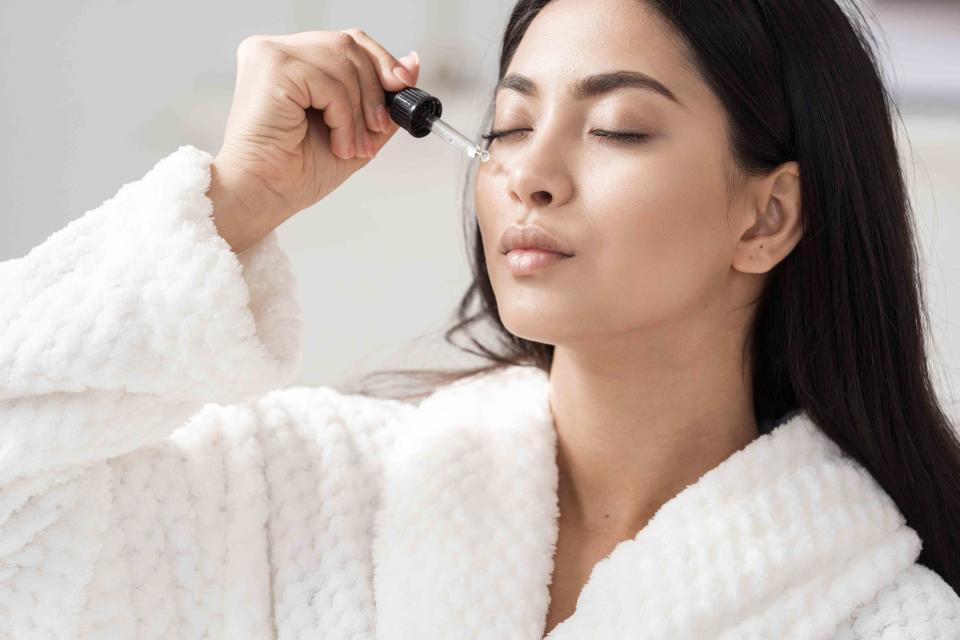Does Retinol Help with Acne? Dermatologists Explain
Clear skin is on the way.

Getty Images
Retinol — a form of vitamin A — is arguably most popular these days for its anti-aging benefits, including evening out your skin tone, smoothing fine lines, and brightening your complexion.
But its superpowers don’t stop there: Retinol is also an extremely effective ingredient for treating acne. Though ingredients like salicylic acid and benzoyl peroxide tend to steal the spotlight when dealing with acne, retinol was the OG. “In the ‘70s, when retinol was becoming more prevalent, it was first known for its ability to treat acne and acne scars,” says Martha H. Viera, MD, a board-certified dermatologist in Coral Gables, FL.
If you’re experiencing acne and your typical ingredients aren’t doing the trick, here’s what to know about using retinol for your blemishes — straight from the pros.
Related: Every Question You've Ever Had About Retinol, Answered
What Is Retinol?
First, let’s dissect some of the skincare lingo that can be confusing for a retinol newbie. Though retinol and retinoids are sometimes used interchangeably in marketing-speak, “retinol is a type of retinoid,” says Hayley Goldbach, MD, a double board-certified dermatologist and professor at Brown University.
They’re both vitamin A derivatives, but “retinol is more mild and available over-the-counter whereas retinoids can only be used via a prescription,” she adds. You still get the same acne-fighting (and wrinkle-smoothing) benefits, but it just takes longer to see results than a more powerful prescription retinoid. The advantage is that it’s less likely you’ll experience side effects like irritation.
Related: Retinol vs. Retinoid: What's the Difference?
How Does Retinol Help With Acne?
“Retinols work by stimulating faster skin cell turnover,” says Dr. Goldbach. "This prevents clogged pores, which is often a major factor that leads to blemishes." In addition, retinol helps regulate sebum production, gets rid of dead skin cells more efficiently, calms acne-induced inflammation, and smooths out unevenness from acne scarring left behind from previous breakouts.
As much of a miracle worker as retinol can be, certain types of acne respond to it better than others, such as comedonal acne (think whiteheads) and inflammatory acne. "However, for hormonal acne or more severe acne like nodulocystic acne, you usually need to use a prescription retinoid oral medication, since it won’t respond only to topical medication alone,” says Dr. Viera. (In other words, you might need Accutane.)
Related: Why Hyaluronic Acid and Retinol Are a Dream Team for Skin
How to Use Retinol for Acne
If you’re new to retinol, slow and steady is the name of the game to help prevent adverse reactions. “For acne-prone skin, start by applying retinol three times a week and then increase the frequency until it’s tolerated nightly. If you have sensitive skin, try the skin cycling method and use it every four days or so,” says Dr. Viera. If you want to be extra careful with sensitive skin, pump a retinol product like Drunk Elephant A-Passioni Retinol Cream or Versed Press Restart Gentle Retinol Serum into your moisturizer or face oil to ease into it.
Speaking of moisturizer, to combat the dryness that can be a result of retinol, pair it with a nourishing moisturizer. “Look for one with ceramides, glycerin, or hyaluronic acid that are super gentle and effective at pulling hydration into your skin,” says Dr. Viera.
Related: The 14 Best Retinol Products of 2023
To minimize potential irritation, “avoid using retinol with other acids like vitamin C, glycolic acid, salicylic acid, and benzoyl peroxide,” she advises. With your dermatologist’s help, you can figure out a plan on how to alternate these ingredients in your routine.
However, especially in the beginning, you want to ensure you’re not using too many new ingredients simultaneously. Whatever you do, don’t forget your SPF: “Since retinol can make your skin more sensitive to the sun, use it during your nighttime routine and be extra diligent about using sunscreen during the day,” says Dr. Goldbach.
How Long Will It Take to See Results?
As with all skincare, patience is key. “It can take months and months to see a real change in your skin after starting a new retinol product,” says Dr. Goldbach. So for the best results, use retinol consistently for clear skin in the long run.
Related: How to Use Retinol In the Summer Without Irritating Your Skin
For more InStyle news, make sure to sign up for our newsletter!
Read the original article on InStyle.

